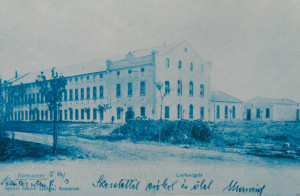 János Fiedler founds Hungary’s first flax-spinning mill in Komárom.
János Fiedler founds Hungary’s first flax-spinning mill in Komárom.
The licences are issued on the 2nd of November 1903 and on the 18th of November 1904 the factory can start production with 2000 spindle and 120 workers.
Establishment and keeping of workplaces fills central part among local authorities’ plans, therefore property is given to spinning mill for free, and the road to mill is constructed also for free.
During the I. World War the production increases up to 500 employees and 5000 spindles. János Fiedler and his family constantly develop mechanical and technological level.
Preparations for upcoming II. World War boosts the industry again. In 1938 already 670 tonns, in 1942 with more than 7000 spindles 895 tonns are produced, employing 1000 workers.
After the II. World War in March 1948 the factory is nationalized followed by numerous reorganizations.
Blessed to workers’ and engineers’ creativity and innovative favourities inspite of unfavorable circumstenses numerous technical-technological modifications are introduced to be able to run the old machines and the new ones coming from the socialist countries on adequate level.
Difficulties of regime changes two survive from 19 BUDA-FLAX plants, the one in Győr, a weaving mill and the other spinning mill in Komárom. After the privatisation both plants go to private ownership. Later the weaving mill in Győr is liquidated, so the spinning mill in Komárom remained Hungary’s only one linen establishment.
- 1996 Modernisation, installation of Mackie preparing
- 2001 Modernisation, installing Sachlafhorst 338 winders
- 2004 Modernisation, installing drying tunnels
- 2005 Membership at CELC, MAsters of Linen
- 2006 Initialisation of Oeko-Tex certification
- 2008 Initialisation of IMO certification
- 2013 Modernisation, installing Volkmann 2 for 1 twisting technology
Its strategic aim is the flexible production and production management and high level customer-service.
Altought the flax yarn considered as a high value added product, the production requires a high labour instesity. Reaching the personal costs over 30% the company had no scope to carry out profitable production activity for future.
In the absence of available technological innovations for saving labour costs the owners decided to stop the production activity.
Thanks to a responsible decision the company is able to start in a satisfactory financial situation and the company meets the legal obligations for 100% redundancy payment.
In additional to fulfilment of maximum redundancy payment the company supported the workers in starting their new life with an outplacement programm involving volonteer experts and in close cooperation with the Employment Office.
After the shut-down the production Hungaro-Len Ltd. sells the production equipments and starts the utilization of it’s territory of 8,5 hectares in the city center of Komárom.
